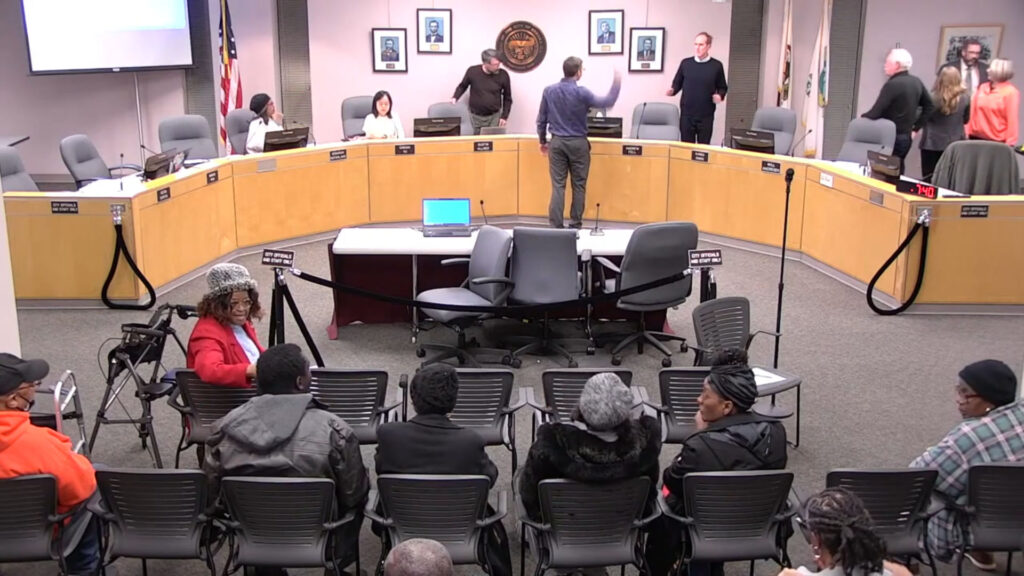
We were recently alerted to a highly suspect closed meeting of the Urbana, Illinois Plan Commission during their deliberations on a contested proposal for a planned unit development (PUD).
On December 7th, 2023, the Plan Commission met in the Council Chambers at the Urbana City Building to discuss a proposal for a development at the northwest edge of Urbana that would offer housing for homeless and medically fragile persons. The PUD, named Hope Village, would consist thirty “tiny homes” as well as a community center, and it would be attached to the north end of an existing Champaign, Illinois neighborhood (right at the borderline between Champaign and Urbana).
Many residents across Champaign-Urbana are in favor of the development for humanitarian reasons, but residents living immediately south of its intended location have expressed a number of concerns, mostly related to the increased traffic (including expected emergency vehicles responding to medical calls) through their quiet neighborhood.
During the meeting, members of the Plan Commission seemed to struggle with their voting procedure regarding the Hope Village PUD. At one point, Commission member Lew Hopkins made a lengthy motion to send the PUD decision on to the City Council. Chair Dustin Allred suggested that the Commission “take a recess and consult with the City Attorney” about the motion.
After consulting with City Attorney David Wesner, the Commission members then voted to take a “recess”, at which point the entire Commission, City staff, and the City Attorney all left and held a ~12 minute meeting in the 2nd floor conference room in the City Building – closed to the public..
The video below starts right at the moment that Chair Allred suggest taking a “recess”:
After they returned from the Council Chambers, the Plan Commission voted to approve the PUD and send it on to the City Council for final approval (the City Council vote is scheduled to take place on Tuesday, January 2nd, 2024).
It should be noted that Mayor Diane Marlin and City Council member Maryalice Wu also attended the Plan Commission meeting, though it is not entirely clear if they also attended the portion of the meeting closed to the public.
The Illinois Open Meetings Act is very specific about what constitutes a public meeting, and it is also very specific about when public meetings can be closed to the public.
“Meeting” means any gathering, whether in person or by video or audio conference, telephone call, electronic means (such as, without limitation, electronic mail, electronic chat, and instant messaging), or other means of contemporaneous interactive communication, of a majority of a quorum of the members of a public body held for the purpose of discussing public business or, for a 5-member public body, a quorum of the members of a public body held for the purpose of discussing public business.
If a public body is discussing public business, it doesn’t matter if it takes place in their official meeting place, or at the grocery store, or at the gym, it is still considered a meeting, and that makes it subject to the OMA. Taking a “recess” is not a clever loophole which nullifies the Open Meetings Act.
The OMA does allow public bodies to enter into closed meetings, but only when certain exceptions apply, such as discussing the discipline of a certain employee or a student, collective bargaining matters, or setting the price for the sale of publicly owned property. None of the listed exceptions would seem to apply to the Plan Commission meeting (and none have been cited).
Furthermore, at the December 18th meeting of the Urbana City Council, it was made very clear by Council Member Maryalice Wu that the hidden portion of the Plan Commission meeting was NOT a closed session:
“I attended the Plan Commission meeting and I know that there was some concern about a closed session. I just wanted to correct for the record it was not a closed session, it was a recess. The recess was to discuss with the City Attorney what steps were legally they were allowed to take. The Mayor went back there to tell them that’s the only thing that they were allowed to do. So I just wanted to clear the air a little bit about that process.”
This statement was made in front of the public, the City Council, the Mayor, and the City Attorney, so there seems to have been some orchestrated agreement by Urbana public officials that the Plan Commission did not hold a closed session. The statement also suggests that some members of the public have already cast criticism toward the City over the questionable closed meeting.
Unlawfully shutting the public out of a public meeting can have legal consequences. Anyone can email a complaint to the Public Access Counselor within 60 days of an OMA violation, or file a lawsuit. The Illinois Attorney General, or a judge, could order the final actions taken by the public body void. In this case, the Plan Commission could be made to hold the same meeting again, and redo the vote on the proposal.
